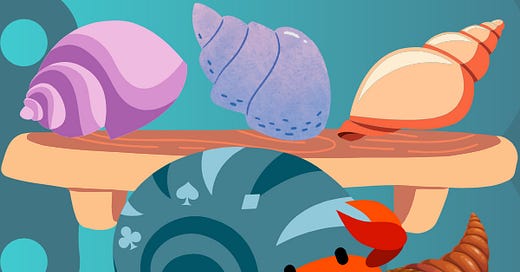Welcome to the November Shell Exchange!
Midway through each month, I drop a list of recommended reads. I try to feature winning hermit crab essays (🦀) when possible. But those charming crabbies aren’t always easy to find. So I also make it a point to share pieces on invisible illness.
If you come across an essay or article I haven’t mentioned that you feel warrants attention, drop the link in the comments, and I’ll add it to the rotation next month.
1. “Millions of Aging Americans Are Facing Dementia by Themselves” by Judith Graham from KFF Health News
“Imagine what this means. As memory and thinking problems accelerate, these seniors can lose track of bills, have their electricity shut off, or be threatened with eviction. They might stop shopping (it’s too overwhelming) or cooking (it’s too hard to follow recipes). Or they might be unable to communicate clearly or navigate automated phone systems.”
2. “Menopause Is a Pretty Damn Fine Stage of Life” by Susan Glickman from The Walrus
“Perimenopause is the shitty part of the equation, because it is so unpredictable. You never know if or when you might have a period, how heavy it will be, or how long it will last. Even someone like me, regular as clockwork from age thirteen, had to carry a couple of tampons at all times, because I no longer knew when a gush of blood might disrupt my activities with its reminder that my body had a mind of its own.”
3. “How Elderly Dementia Patients Are Unwittingly Fueling Political Campaigns” by Blake Ellis, Melanie Hicken, Yahya Abou-Ghazala, Audrey Ash, Kyung Lah, Anna-Maja Rappard, Casey Tolan, Lou Robinson, and Byron Manley from CNN
“More than 1,000 reports filed with government agencies and consumer advocacy groups reviewed by CNN, along with an analysis of campaign finance data and interviews with dozens of contributors and their family members, show how deceptive political fundraisers have victimized hundreds of elderly Americans and misled those battling dementia or other cognitive impairments into giving away millions of dollars — far more than they ever intended.”
4. “Life with Irritable Heart Syndrome (POTS)” by Rebecca Upton from Disability, Chronic Illness, & Culture
“I don't know when my symptoms of POTS started exactly. The first time I fainted, I was in high school. I was walking, and the next I knew I was on the floor. As an adult, doctors have recorded many occasions where my pulse was racing. Instead of looking into it more, they just assumed I tended to have a faster pulse. And then eventually, for a while, it said ‘low blood pressure’ in my chart, and that was presumed to be why I had fainted in the past.”
5. “Abby…Normal?” by Aisling Walsh from AutCasts
“If autism representation in media leaves a lot to be desired, then epilepsy representation is practically non-existent outside of the horror genre. And here, seizures often become a signifier of profound mental, physical or spiritual disorder and/or demonic possession.”
6. “Depression in 100 Word Doses” by Judith Hannan from The Manifest Station
“I am afraid to be dead. Not of dying. Well, that too; I don’t want pain or to see my death coming. But dead means nonexistence and that’s what terrifies me.”
7. “Coping Lessons From My Uncle Howie” by Sara Eckel from It’s Not Us
“We drove from store to store, and every time I made a left-hand turn, he’d say ‘You got it!’ Each evening, he’d tell me what a wonderful dinner I’d prepared, even though it usually was just the supermarket bagged salad and breaded seafood. His praise never sounded condescending; he just appreciated the effort.”
8. “Risk Assessments” by Karin Jones from The Audacity
“My craving to be with new men was every bit as urgent as my drive to become a mother, as though a biological alarm clock had gone off in me to screw or die. Call it hormonal, emotionally wounded, or a well-deserved crack at a midlife Rumspringa, I couldn’t stay away from them; the brooding, zestful he-wolves of our species.”
9. “The Year of the Cat” by Elisabeth Donnelly from Memoir Monday
“I flattered myself, thinking Slut wanted to be my friend. And why wouldn’t she? We hung out together on my couch. I had a nickname for her. And I never pulled her tail. But the real story, as my landlord told it, was that Slut was born in our house, spent her formative years there hunting for mice, and then moved across the street to live with her original owner’s daughter and her kids, including the little girl monster. The cat never quite took to the move. She haunted our house because she was always and forever trying to get back home.”





